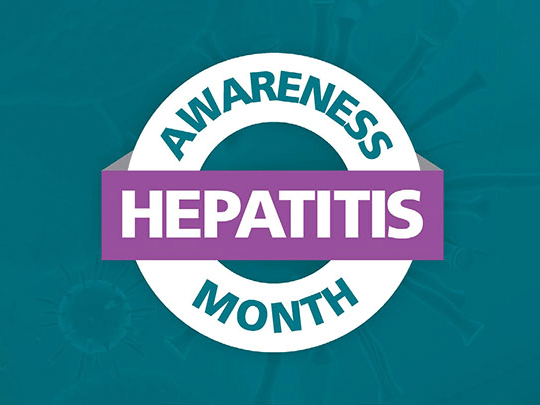HRSA’s Ryan White HIV/AIDS Program Observes Hepatitis Awareness Month, Advances Efforts to Eliminate HIV/HCV Coinfection

May is Hepatitis Awareness Month, and May 19, 2019, is Hepatitis Testing Day. The Health Resources and Services Administration’s (HRSA) Ryan White HIV/AIDS Program has a long-standing commitment to providing health care and support services for low-income people with HIV who are coinfected with hepatitis C. As the Ryan White HIV/AIDS Program observes Hepatitis Awareness Month and Hepatitis Testing Day, we highlight the importance of testing and treating people coinfected with HIV and viral hepatitis and recognize hepatitis C-related efforts underway throughout the program.
Partly fueled by the opioid epidemic, new hepatitis C virus (HCV) infections more than tripled between 2010 and 2016. Although advances in HIV care and treatment result in longer life expectancy for people with HIV, those who are coinfected with HIV and hepatitis C still have a high risk of liver-related illness and death. Viral hepatitis progresses faster and causes more liver-related health problems among people with HIV than among those who do not have HIV. Approximately 25 percent of people with HIV in the U.S. are coinfected with hepatitis C.
Recent advances in treatment make it possible to win the fight against hepatitis C. A simple blood test can detect hepatitis C infection years before symptoms develop, and the several recently FDA-approved treatment options for hepatitis C are a game-changer for hepatitis C care and treatment. For the first time, persons infected with hepatitis C can be cured with all-oral, once-daily treatment regimens that last eight to 24 weeks and have minimal side effects. Experts recommend that all people with HIV be tested for hepatitis C and, if positive, considered for hepatitis C treatment because being cured of hepatitis C can prevent liver disease and liver cancer and greatly improve health outcomes.
The Ryan White HIV/AIDS Program provides the infrastructure to screen and treat people with HIV for hepatitis C and is committed to eliminating hepatitis C coinfection among all RWHAP clients. Toward that end, HRSA HAB has been supporting innovative work to expand provider, clinic, and jurisdictional capacity to provide comprehensive hepatitis C screening, care, and treatment for people with HIV.
- Two Special Projects of National Significance (SPNS) projects are underway that are supporting jurisdictions to increase their capacity to provide comprehensive screening, care, and treatment of hepatitis C among clients with both HIV and hepatitis C and increase the number of HIV/HCV coinfected clients who are diagnosed, treated, and cured of hepatitis C infection. We look forward to sharing best practices, lessons, and tools resulting from these projects to support other jurisdictions and clinics.
- HRSA also supported the development and release of a free, online curriculum about HIV/HCV coinfection for healthcare providers and healthcare staff educators. HIV/HCV Co-infection: An AETC National CurriculumExit Disclaimer is an important, evidence-based resource for health professionals and will help expand capacity for treating everyone living with HIV/hepatitis C coinfection.
As we observe Hepatitis Awareness Month, we acknowledge and send our appreciation to stakeholders across the Ryan White HIV/AIDS Program whose efforts are helping us advance toward the goal of eliminating hepatitis C coinfection among our clients. And we also congratulate the clients who have successfully completed treatment.
Visit HRSA’s TargetHIVExit Disclaimer for more information and for valuable HIV/hepatitis C coinfection resources, and join the online conversation by following #HepAware19 on Facebook and Twitter.